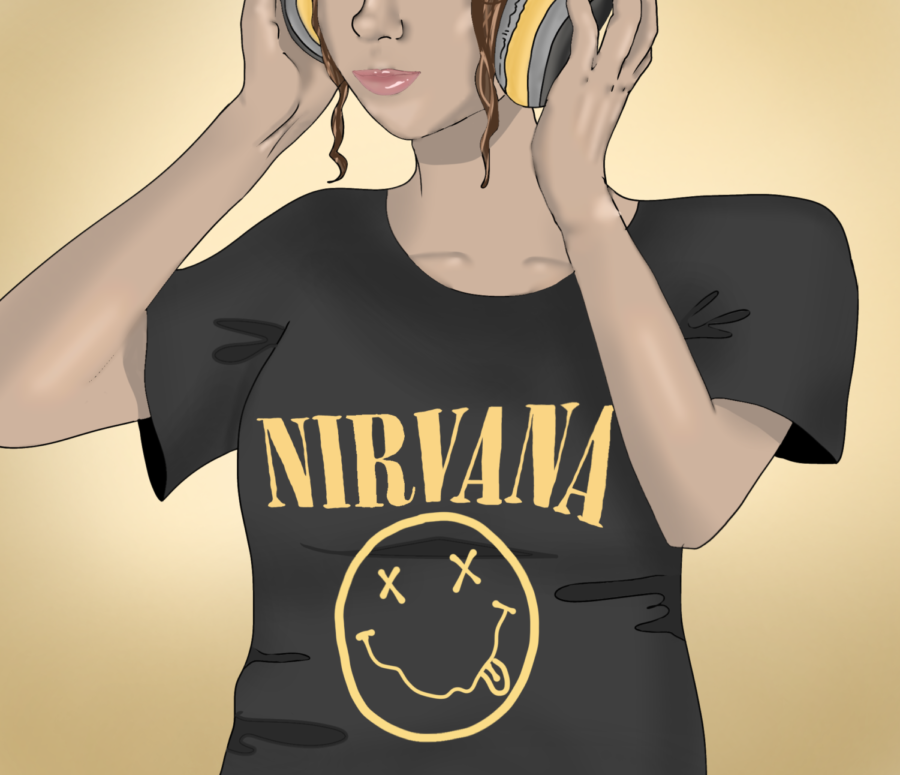Nirvana’s “Nevermind” remains relevant 30 years after its release
30 years later, Nirvana’s “Nevermind” continues to be relevant to this day.
October 25, 2021
Nirvana’s second studio album, “Nevermind,” was released on Sept. 24, 1991 and exploded in popularity, shocking the world with its distinct sound and lyrics. Thirty years later, the album continues to resonate with people, with Nirvana currently having 21,407,677 monthly listeners on Spotify.
Nirvana was one of a handful of underground grunge bands in Seattle and the first to achieve significant popularity, with their songs receiving regular play on both the radio and MTV. The exposure of their music led to drastic changes in the music industry, as Nirvana was fresh from the music that came before them.
English teacher and Nirvana fan Michael Morelli talked about his first impression upon listening to the album.
“When I first listened to ‘Nevermind,’ I was probably 12 years old. And my first thought was that it was kind of sad,” Morelli said. “Most rock music [at the time] was kind of happy, had a strong beat and they’re talking about living it up and partying and all that stuff. But ‘Nevermind’ was kind of sad and a lot more emotional.”
Before Nirvana’s sudden increase in popularity, most other rock bands had a frontman that was overconfident and gave off a “macho” image. A good example is Axl Rose from Guns and Roses, who had an infamous feud with each other. According to the New Yorker’s article “An Appreciation of Nirvana’s 1991 Album, ‘Nevermind’,” “it seemed self-evident [prior to Nirvana’s explosion in popularity] that musicians who rejected mainstream professionalism would remain on the fringes.”
However, Nirvana changed that. In many interviews and liner notes of his songs, lead singer Kurt Cobain decried sexism, racism, and homophobia unlike other musicians from this era, one such example being from “Incesticide:” “If any of you in any way hate homosexuals, people of different color or women, please do this one favor for us—leave us the f— alone! Don’t come to our shows and don’t buy our records.” One of the songs from “Nevermind,” “In Bloom,” also touches on this point, as Cobain notes that certain people at his shows listen to his songs and sing along to them, but don’t know what they mean: “He’s the one / Who likes all our pretty songs / And he likes to sing along / And he likes to shoot his gun / But he knows not what it means / Knows not what it means.”
“I think it [Nirvana] led to a lot more artists who did not want to be popular or who shun popularity to kind of embrace the spotlight as a way to say, ‘even though I’m in the spotlight, I’m not like you, I can still be myself,’” Morelli said. “And I think that’s really changed the way that music has been seen because people who are anti-establishment are now part of the establishment.”
In an interview with BBC, Vernon Reid of rock band Living Colour stated the impact that Nirvana — specifically Cobain and his words and actions — had.
“There are certain people where you can see the axis of musical history twisting on them: Hendrix was pivotal, Prince was pivotal, Cobain was pivotal,” Reid said.
Nirvana’s impact is not only visible in the music industry, but outside of it as well. Some people find Cobain’s lyrics to be nonsensical, and it’s easy to say that when hearing phrases like “A mulatto, an albino, a mosquito, my libido” (from “Smells Like Teen Spirit”) and “Aqua seafoam shame” (from “All Apologies”). However, a lot of his lyrics have been said to be poetry filled with metaphors based off of his experiences and his emotions. To add some context, for most of his life, he struggled with depression and mental health issues and his suicide in 1994 at the height of his fame shocked the world. While at the time many of his fans blamed his death on his unwanted fame, it’s important to note that that is not the whole reason.
“He struggled with depression for all of his life. And when you struggle with that day to day, a lot of the time your head can just overflow with thoughts and with things,” Morelli said. “A lot of Nirvana’s work is him [Cobain] making meaning of a world that doesn’t make sense to him. And so not every song that he released or he wrote might make sense. But I do think that he is trying to understand the world in his own way. And even if it doesn’t make sense to us, it might have made sense to him.”
Nirvana also had a large impact on mental health awareness, as Cobain’s sucide caused a lot of people to consider their own mental health. It has allowed the conversation about mental health to evolve as people have become more and more candid about their mental health and people aren’t judged severely for their mental health issues, allowing them to get the treatment that they need. A significant amount of people today continue to suffer from mental health issues. According to the National Alliance on Mental Illness, 1 in 5 U.S. adults experience mental illness each year, and 44.8% of U.S. adults with mental illness received treatment in 2019. While the second number seems small, it is still a significant increase from the 1990s, when only 20.3% of people received treatment between 1990 and 1992, according to a research report from the New England Journal of Medicine.
“I started to think more about my mental health and people’s mental health around me the more I listened to Nirvana,” Morelli said. “When people saw Kurt Cobain being sad and eventually taking his own life, that was kind of a wake up call to a lot of them.”
When thinking about Nirvana’s impact on the world both musically and culturally, it brings into question whether their success is a unique phenomenon or if another musical artist or album can achieve such widespread success and relevance decades after its release. And many people have been wondering when the next Nirvana will show up, when the next big musical artist will show up. However, it remains unknown if that will ever happen. With the increasing fracturation of the music industry due to the rise of streaming services and the decline of radio (“MusicWatch market research shows streaming outperforming radio in each of the last five years,” according to an article from the Variety), which has led people to more effectively pick and choose what music they listen to, time will only tell if another music artist in the future will leave a similar impact.
“I doubt that another album will have that impact, but I would love to see it,” Morelli said, elaborating on what shift in the music industry might be interesting to see. “I would also love to see a band be so different and really kind of take what is popular right now and turn it on its head like a parody of what’s popular right now … it would just be interesting to see how the world would react to see that and what change might happen because of it.”
Despite the impact they have had across multiple industries, Nirvana first started from practically nothing. They formed in Aberdeen, Washington in 1987, and just four years later, they had broken into the mainstream and became famous nearly overnight with the release of “Nevermind” and its hit single “Smells Like Teen Spirit,” which received consistent play on the radio and on MTV. Thirty years later, their influence can still be seen, as people musicians all over the world continue to cite Nirvana as an inspiration. Nirvana shirts are also commonly worn all over the country. It’s clear that Nirvana has left a significant impact on the world many years after their original peak in popularity.
“They were just three guys, three friends who said ‘Hey, we like music, let’s try making it,’ and man, did they make music,” Morelli said. “That’s one reason it feels so real …. it’s just three guys hanging out in the garage and Seattle with nothing else to do, so let’s just get together and make some music.”





